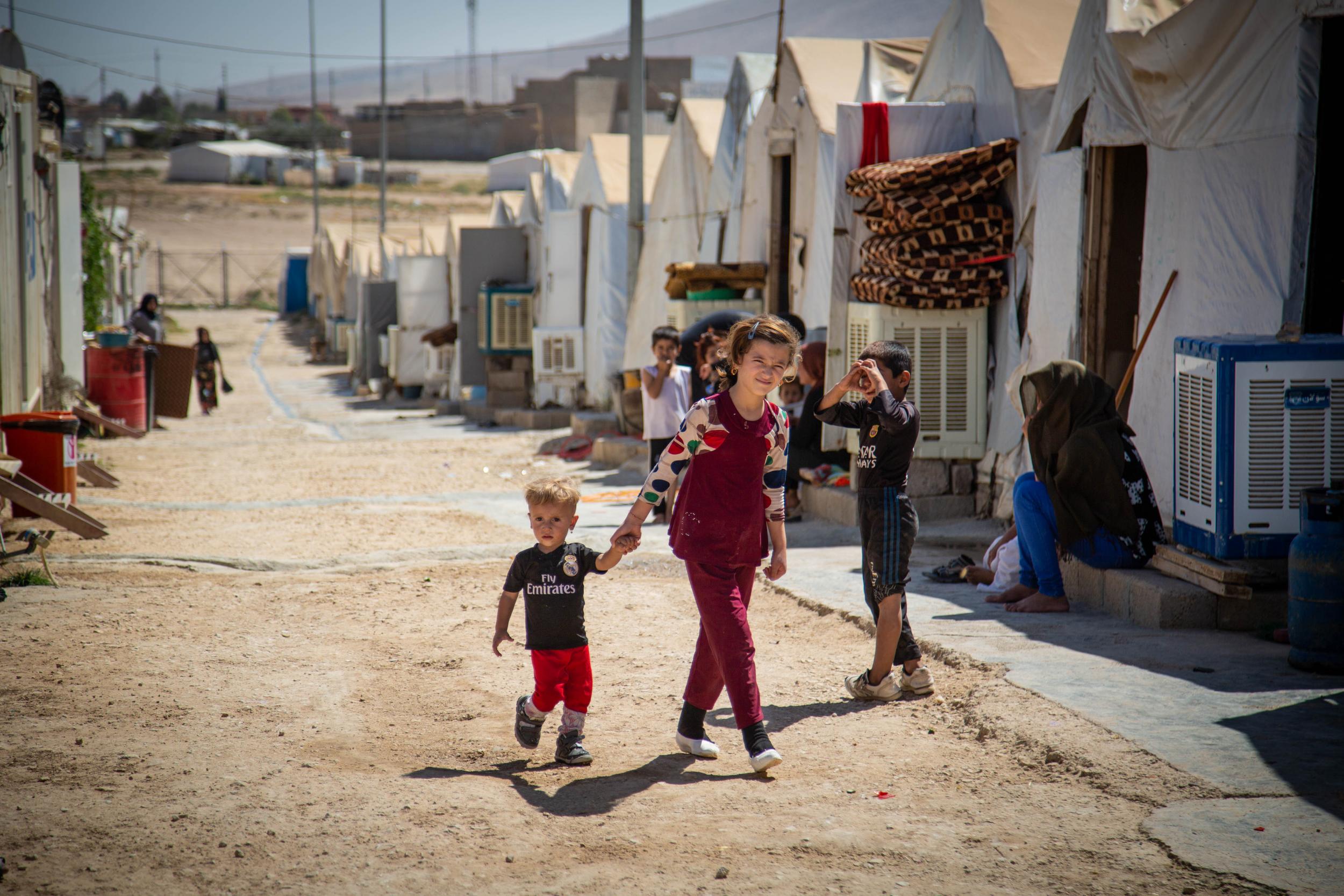Yazidi leaders issue ‘historic’ call for children of Isis rape survivors to return home
Before the ruling, women faced an impossible choice: abandon their child and return to home, or live in exile with their children?

Yazidi leaders have ruled that the children of Yazidi mothers who were born as the result of rape by Isis fighters can now return home, reversing a controversial policy that sought to isolate them from their community.
Thousands of Yazidi women and children were taken captive by Isis in the summer of 2014, when the terror group carried out a murderous rampage against the small religious minority in their traditional homeland in northern Iraq.
During years of captivity, many women gave birth to children after being raped by their captors.
Due to the ancient religion’s strict adherence to its genealogical identity, those women were faced with an impossible choice when they finally escaped the clutches of Isis: abandon their child and return home, or live in exile and keep their children. Many chose to stay away.
The new ruling, issued by the Yazidi Supreme Spiritual Council, called on members of the faith “to accept all survivors and consider what they have been subjected to beyond their control”, including their children.
The decision was welcomed by Yazidi rights groups, many of which have been campaigning for reform on the issue.
“This decision is very important. We believe those women deserve to be returned back, including their children. They need our support, our respect and our help,” said Ahmed Khudida Burjus, the deputy executive director of Yazda, a Yazidi advocacy group.
Mr Burjus said there are potentially dozens of women who gave birth to the children of Isis fighters still in Syrian camps, too afraid to return to their historic home in northern Iraq because they may be forced to give up their child. Many others who returned have given up their children to orphanages — due to societal pressure or the because of the trauma of their experience.
But although the ruling could ease some of those fears, the community’s traditions and historic norms mean Yazidi women returning home with their children may still find resistance from within their own families.
“It is a closed religion. Traditionally, a Yazidi has to be from Yazidi mother and father,” said Mr Burjus. He added that although the decree may be a sign that things are changing, there will be a difficult road ahead.
Wadha, a 24-year-old Yazidi woman who was held captive by Isis for a year and a half, told The Independent that her feelings were mixed.
“I do not know what to say, it is very difficult to comment about this topic, because the Yazidi blood cannot be mixed. But the mother who is a victim and suffered a lot, she is free to decide if she wants to keep her children or not.”
She said that her own family has struggled with the issue. Her niece was 14 years old when she was captured by Isis, and had two children by “Isis fathers”.
“When she was freed, she wanted to bring her children with her, she said they are her responsibility. But her father said no, because the community will not accept them.”
“My niece cannot recover from her trauma, she says that ‘half of me is missing, my children’”, she said.
The ruling is not the first time that the unique circumstances presented by the Isis genocide has forced the long-persecuted Yazidi minority to update its religious teachings. The council had previously adapted its rules to allow Yazidis who had been forced to convert to Islam, and women who had been forced to marry their Isis captors, to return to the faith.
Those earlier rulings represented a “massive change”, according to Dr Zeynep Kaya, research fellow at the LSE Middle East Centre and researcher on the impact of genocide on the Yazidi community, but the most recent one on children was “historical, it was immense”.
“The Yazidi religion and genealogical identity are directly connected. This has been a very long-term tradition. They had a history of dispersal, and being marginalised, and so wanted to maintain their identity,” she said.
This led to some families taking measures to hide the true identity of the children, according to Dr Kaya. Some religious leaders had proposed sending mothers with children of Isis fighters abroad if they did not want to be separated.
She added that the ruling on accepting these children is likely to be “even more divisive”.
In the meantime, the Yazidi community in Iraq is still struggling to recover in the aftermath of the genocide. More than 3,000 Yazidis are still unaccounted for, even after Isis’s territorial caliphate has been destroyed. Yazidi advocacy groups have called on the international community to do more to help find those still missing.
Last month, Iraqi authorities opened the first mass grave containing Yazidi victims in the town of Sinjar. A UN team investigating the massacres that took place when Isis overran the area said it had discovered 73 mass graves in Sinjar alone.
Subscribe to Independent Premium to bookmark this article
Want to bookmark your favourite articles and stories to read or reference later? Start your Independent Premium subscription today.

Join our commenting forum
Join thought-provoking conversations, follow other Independent readers and see their replies